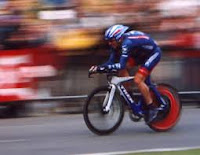 |
| Lance Armstrong |
Armstrong's lie unraveled when teammate, Alan Landis, was caught with a banned substance in his system by the US Anti Doping League after his long awaited Tour of France win. Landis, riding for years in Armstrong's shadow, claimed that Armstrong had orchestrated a campaign to cover up the US Postal Team's doping activities. Armstrong remained steadfast that he hadn't used performance enhancing drugs until his confession.
The Justice Department filed a motion to suppress Armstrong's defense that professional bike racing is a dirty sport in which "everyone was doing it." Armstrong's lawyers attempted to submit a summary of the sport's 125 year history of doping including the use of heroin in the 1890's and amphetamines in the 1950's. The government lawyers were seeking triple damages under The False Claims Act (FCA). Landis obtained whistleblower status even though he was caught doping himself which entitles him to a quarter of the $100 million lawsuit. Things didn't go as planned for the government team of lawyers who claimed that Armstrong's doping caused over a billion dollars of negative advertising to the US Postal Service. Lance's lawyers stipulated that the government got millions in positive press for its investment in the cycle team.
Some people think that Lance Armstrong sat around on the couch, watching Animal Planet while sipping Mountain Dew and eating Pringles, then shot up some dope just before he hopped on his bike to win the Tour of France. That just wasn't the case. Like the Mr. Universe bodybuilding competition, athletes in cycling must train to their physical limit before they take performance enhancing drugs to push into the stratosphere. Lance Armstrong won because he was willing to do what he had to do to cross the finish line first. The truth is that just about everyone competing in the Tour of France who was anywhere near contention was taking something to be there, and the organizers loved it.
 |
| Lance Kicking Ass |
Every competitor in the Mr. Olympia bodybuilding contest is taking some form of steroids. It is so prevalent that they don't test the athletes even though steroid use is banned. Performance enhancing substance abuse is more than just implied. It is so overt that they have a Mr. Natural Olympia competition in which the athletes sign agreements stating that they won't dope. Many natural competitors have been accused of taking drugs. The reason there is such a dichotomy in bodybuilding contests is because the event organizers and sponsors know that spectators want to see more massive athletes each year. The same drive to win with all its financial benefits is the reason why so many cyclists dope.
Some racers installed small powerful electric motors in their bike frames to give a boost when needed. Many transfused additional blood to their system, the so called "blood doping," which increase the amount of hemoglobin enhancing oxygen transport. Others took banned substances. If you want to win, you have to train hard and take any available advantage to be competitive. The truth is when Lance Armstrong won our doped out cyclist beat another country's doped out cyclist.
I followed Lance Armstrong's career because I was a longtime cyclist who was enthralled with his cancer survivor story. When he divorced his wife and began boffing Sheryl Crowe, I was bit turned off. Then Lance was seen with Ashley Olsen who was 14 years his junior. Armstrong's handlers encouraged him to break it off since the relationship negatively impacted his image. He dumped Olson for Kate Hudson who was closer to his age. Ashley Olson began dating the Hollywood director, Bennet Miller, who was almost 20 years her senior. Her sister, Mary Kate, married French financier, Oliver Sarkozy, who is 17 years older than her. Not that there's anything wrong with that.
I was crushed when Lance confessed to Oprah, and to this day I don't know why he came clean. He should have taken the truth to his grave. There's been a lot of speculation as to what Armstrong's angle was, but I never heard anything that makes sense. I think the Justice Department's case was an overreaching bureaucratic frivolous lawsuit. The US Postal Service spend $32.3 million sponsoring Armstrong and his team from 2000 to 2004. No one said,
"Golly, now that Armstrong admitted to doping and was stripped of his seven Tour of France wins I'm gonna mail my letter with someone else."
 |
Armstrong is now in a committed relationship with Anna Hansen, whom he had two children with purportedly via natural means. He's no longer part of the charity he started, Livestrong Foundation, a nonprofit organization that provides support to people affected by cancer. I'm glad that Lance settled his lawsuit with the government even though he's banned for life from ever competing in racing or working in a bike shop. The guy is a survivor. He beat cancer. He beat a childhood sans a father. He beat the odds of procreating with only one nut. He beat all the people he defamed when he lied about doping. Now, he beat the Department of Justice. Good on him.
Through it all I still follow Lance Armstrong's career. I just wish he didn't exploit the Olson twin's daddy issues.
Editor's Note: Originally published on July 25, 2017.







